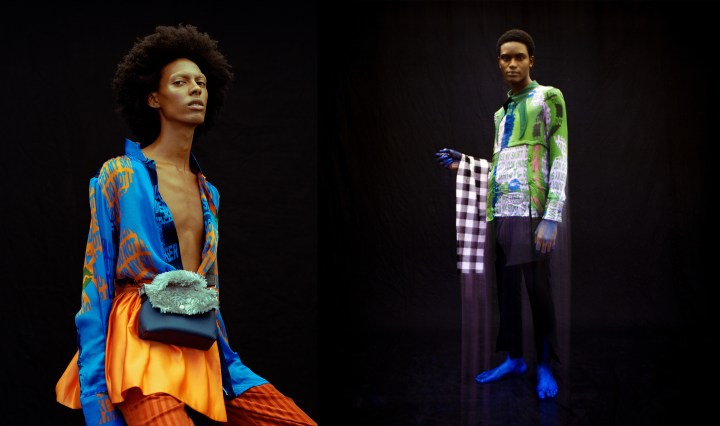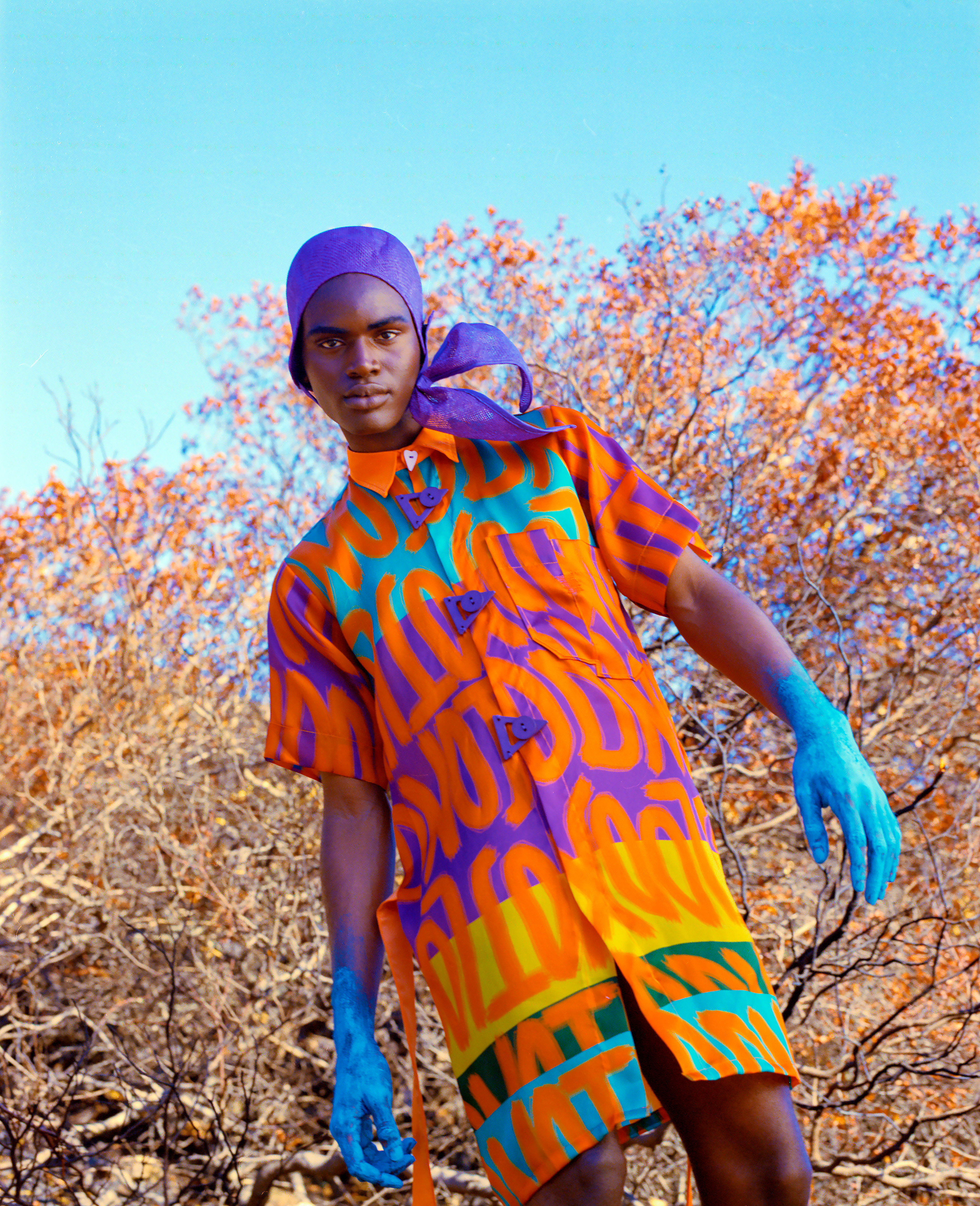MAVERICK LIFE: FASHION
Orange Culture: A decade of shifting gender stereotypes

One of Nigeria’s best-known fashion brands had a very unpromising start to life 10 years ago. Gender fluidity was a rather alien concept back then, but things are changing, slowly but surely.
When self-taught Lagos fashion designer Adebayo Oke-Lawal launched a new label called Orange Culture, it did not go well. “I launched in 2010, with my savings. I launched and got the worst feedback in the world!
“From everyone, online, in Nigeria. Things like: ‘What is this guy doing? He’s trying to feminise men’,” recalls Oke-Lawal.
“I spent a lot of time crying. After that, I was like, ‘What am I gonna do? Am I going to stop this now because of all of this? Or try to make people understand the brand?’ Because the feedback was very unconstructive, very malicious. I decided to keep going.”
Fast-forward to 2020 and it seems society is steadily moving towards more fluid ideas on gender.
There has been a remarkable worldwide turnaround on this issue in just a decade. In the US, same-sex marriage went from being legal in one state in 2004 to all 50 states in 2015. Nonetheless, many African governments and societies remain opposed to ideas about gender expression and sexuality that diverge from traditionally accepted roles.
Having grown up in Nigeria, Oke-Lawal has been acutely aware of gender expression and it has been central to how he developed Orange Culture.
“I sounded different, I looked different, I was dressing different… So a lot of people bullied me,” he says.
“It was quite an interesting experience because people were so averse to anything that was different or felt strange or that was threatening who they were. I spent [a lot of that time] figuring out who I was, being suppressed by all of that, having to deal with all of these ideas of masculinity. It was a bit intense, but it helped me build the brand I have today; it helped me build Orange Culture. It is the reason I’m so passionate talking about all the things I talk about.”
The Lagos-based ready-to-wear and bespoke menswear brand, with signature bright colours and daring silhouettes, has gained recognition and a growing customer database, not only in Nigeria but around the world.
The company operates from an office in Lagos through stockists like Alara, a concept store in Lagos that showcases a multitude of luxury fashion and homeware brands, as well as an online shop. Eight people work at Orange Culture and Oke-Lawal says it has been profitable since last year.
“We don’t have investors, but we’re making money now. Obviously we’re still growing and we’re investing back in the brand. So, even if we’re making money, the money is still going back into expanding. We’re making enough money to keep growing.”
Orange Culture’s rainbow silhouettes combine blazers in bright orange with culottes, shimmery tunics with tied-under-the-chin bonnets, bold patterns, silky wide-leg pants in petrol blue, and sequin dresses. The creations certainly stand out. The collections might have shocked a more conservative audience at first, but things have changed, he notes.

Orange Culture, Autumn/ Winter 2019 (Image courtesy of Orange Culture)

Orange Culture, Autumn/ Winter 2019 (Image courtesy of Orange Culture)

Orange Culture, Autumn/ Winter 2019 (Image courtesy of Orange Culture)
“I think that, as individuals, it is shifting. Individuals are beginning to realise maybe this is not what we thought it was, maybe we’ve been educated wrong. There’s a young generation, especially the Gen Z, who are a bit more welcoming and trying to understand rather than just antagonising.”

Orange Culture, Autumn/ Winter 2019 (Image courtesy of Orange Culture)

Orange Culture, Autumn/ Winter 2019 (Image courtesy of Orange Culture)

Orange Culture, Autumn/ Winter 2019 (Image courtesy of Orange Culture)

Orange Culture, Autumn/ Winter 2019 (Image courtesy of Orange Culture)

Orange Culture, Autumn/ Winter 2019 (Image courtesy of Orange Culture)
Oke-Lawal has just turned 30 and was a finalist in the coveted LVMH Prize before he’d reached the age of 25.
Over the past few years, Orange Culture has been a regular on platforms such as Lagos Fashion & Design Week (LFDW) and South African Menswear Week. Like Maki Oh, the brand designed by fellow Nigerian designer Amaka Osakwe, Orange Culture has travelled to New York Fashion Week and been featured in editorials in many of the world’s leading luxury fashion magazines.
Oke-Lawal tells Maverick Life that the brand sells “from 30 to 40 pieces a week to sometimes 200 pieces a month. It varies, it’s a very volatile industry where you do things on the go, especially in Nigeria, it’s never the same.”
In addition to the publicity that has put the spotlight on the designer’s work, Oke-Lawal has also focused on teaching people how to understand his brand, explaining why the clothes, though different from what people are used to seeing in menswear collections, are worth a look and a try.
“I find that using my personal brand is really helpful; [showing myself] as an individual living so fearlessly and wearing the clothes and just living my everyday life in the clothes… I realised that every time I wore the clothes people seemed more interested; they say, ‘Oh wow, so you’re wearing it this way’. Creating a sort of living-your-life-in-the-clothes type of experience was one of the things that really helped grow our consumer base.
“We had a lot of men saying, ‘I love these colours, but I don’t want people to think I’m gay’. So, there was that fear, but then the fashion industry also started becoming more fluid and it started becoming more androgynous; men started seeing that [they could] actually push a little bit to wear pink, or wear red. And consumers were now asking, ‘Why am I aligning my whole sexuality to a garment when I actually love the garment!’
“People started becoming a lot more liberated. Now, we have bankers as customers, and even religious leaders as customers; most of them are just like, ‘I just want to buy the clothes. I don’t care. I just want to buy these garments’. We started going from this niche market with one, two to three customers, to now selling in Australia and China.”
There was long a consensus that there was no market for luxury fashion brands on the continent, but a few designers – emerging and established – are challenging that idea.
“A lot of things are changing,” points out Oke-Lawal. “There’s a new trend where buying African is now interesting; before, when we were younger, people used to tell us, ‘Oh, you need to buy from Louis Vuitton or Chanel’, but people are now saying, ‘Okay, maybe I can actually support my own industry, I can buy from people here’. That’s why we have stores like Alara, who are doing well.
“People are saying, ‘Maybe I should buy a Nigerian garment to wear with my Chanel trousers, or get me Maki Oh to wear with my Zara. Ten years ago it was different, but now there’s a social consciousness that’s happening in the consumer and that’s also helping local consumerism as well.”
That said, there are still many challenges for designers on the continent, especially when it comes to sourcing textiles, the logistics of manufacturing and turning fashion brands into profitable and sustainable businesses.
Oke-Lawal’s recently launched mentorship initiative seeks to confront some of the challenges.
“I’ve been doing the mentorship classes for about two years now, but the programme officially launches this year. The first class is really about bridging the gap between business and creativity for fashion designers, to help the transition from being just a creative designer to a financially viable designer. We’re bringing in some of the big designers here, who have sustained businesses that are running and selling globally, and we’re basically allowing all of these young people to have intimate interactions with them.”
While the market continues to grow, and societal attitudes shift to create space for diverse gender expression, there is still a long way to go. Nigeria, like many other African countries, is still a challenging – and sometimes dangerous – space for people whose gender expression and sexuality doesn’t fit norms. Oke-Lawal is under no illusion about that.
“Being queer and living in Lagos right now is tough. No one can say it’s not tough. Just knowing that you can’t be free to do whatever you want to do, be with whoever you want to be with, without feeling a sense of being threatened…
“But there is a crop of people who are fighting just by being themselves, not necessarily fighting by standing up to government, but fighting by living that truth, fighting by using their social platforms to speak on the things they love and the things they’re passionate about. And so those people are encouraging a new generation,” he explains.
“Obviously, there are times when you’re afraid. But I think we’re all just trying our hardest; that’s really it. We’re just trying to be ourselves and trying to be happy in this world because we love our country, we just have to make the best of the situation. And hope that every day, you are not going to be stabbed or killed.
“I want to be here. I could always travel and go to other countries, but I’ve never imagined a world where [I was] living somewhere else permanently. I love being here”. ML
If you would like to share your ideas or suggestions with us, please leave a comment below or email us at [email protected] and [email protected].
Sign up for our newsletter to get the best of Maverick Life delivered to your inbox every Sunday morning.

















